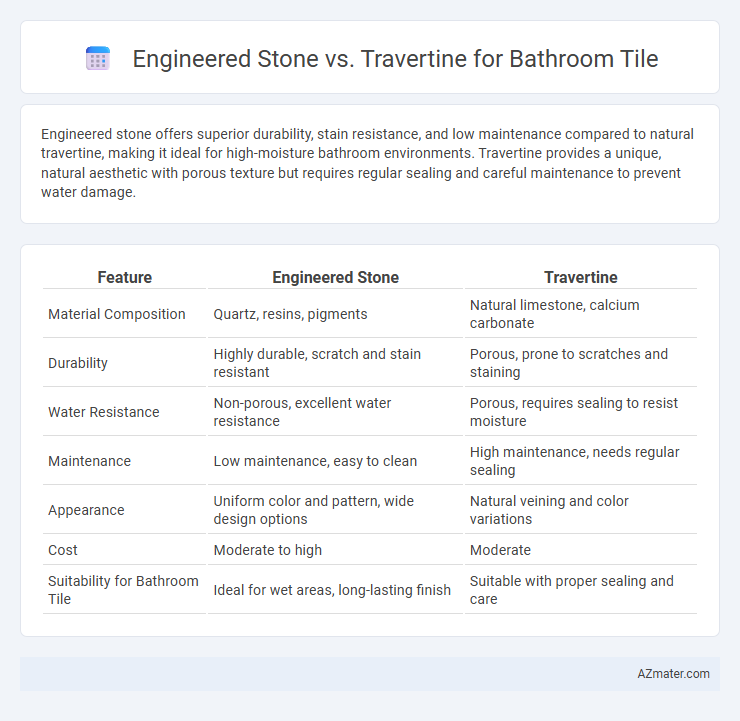Engineered stone offers superior durability, stain resistance, and low maintenance compared to natural travertine, making it ideal for high-moisture bathroom environments. Travertine provides a unique, natural aesthetic with porous texture but requires regular sealing and careful maintenance to prevent water damage.
Table of Comparison
| Feature | Engineered Stone | Travertine |
|---|---|---|
| Material Composition | Quartz, resins, pigments | Natural limestone, calcium carbonate |
| Durability | Highly durable, scratch and stain resistant | Porous, prone to scratches and staining |
| Water Resistance | Non-porous, excellent water resistance | Porous, requires sealing to resist moisture |
| Maintenance | Low maintenance, easy to clean | High maintenance, needs regular sealing |
| Appearance | Uniform color and pattern, wide design options | Natural veining and color variations |
| Cost | Moderate to high | Moderate |
| Suitability for Bathroom Tile | Ideal for wet areas, long-lasting finish | Suitable with proper sealing and care |
Introduction to Engineered Stone and Travertine
Engineered stone consists of crushed quartz mixed with resin and pigments, offering high durability, stain resistance, and a consistent appearance ideal for bathroom tiles. Travertine is a natural limestone characterized by its porous texture and unique veining, requiring regular sealing to maintain its beauty and prevent water damage. Both materials provide distinctive aesthetics, but engineered stone delivers enhanced longevity and low maintenance compared to the more delicate travertine.
Appearance and Design Versatility
Engineered stone offers a consistent, sleek appearance with a wide range of colors and patterns, making it highly versatile for modern bathroom designs. Travertine provides a classic, natural look with unique veining and texture, ideal for creating a warm, rustic ambiance. The design versatility of engineered stone allows for seamless integration with various styles, while travertine's distinct natural variations add character and timeless elegance.
Durability and Longevity
Engineered stone offers superior durability in bathroom tile applications due to its non-porous surface, resistance to staining, and high resistance to cracks and chips, ensuring long-term performance with minimal maintenance. Travertine, a natural stone, provides unique aesthetic appeal but is more porous and prone to scratching and etching, requiring regular sealing and careful upkeep to maintain its appearance. For lasting durability and longevity in moist bathroom environments, engineered stone is generally a more reliable choice compared to travertine.
Water and Stain Resistance
Engineered stone offers superior water and stain resistance compared to travertine, making it an ideal choice for bathroom tile where moisture exposure is frequent. Unlike porous travertine, engineered stone is non-porous and requires minimal sealing, preventing water absorption and reducing the risk of mold or mildew development. Its durability against staining substances such as soap scum and cosmetics ensures long-lasting aesthetic appeal in high-moisture environments.
Maintenance Requirements
Engineered stone offers superior resistance to stains, scratches, and moisture, requiring minimal maintenance with simple cleaning using mild detergents. Travertine, being a porous natural stone, demands regular sealing to prevent water damage, staining, and mold growth commonly encountered in bathroom environments. Consistent upkeep of travertine includes using pH-neutral cleaners and avoiding acidic substances, whereas engineered stone withstands daily wear with less frequent upkeep.
Installation Process and Considerations
Engineered stone tiles offer a straightforward installation process due to their uniform size, thickness, and density, which allows for precise cutting and consistent adhesive bonding, making them ideal for bathroom surfaces prone to moisture. Travertine requires more careful handling during installation because of its porous nature and softer texture, necessitating thorough sealing before and after installation to prevent water damage and staining. Both materials demand a level substrate, but engineered stone's low porosity reduces long-term maintenance compared to the natural stone's vulnerability to etching and efflorescence.
Safety and Slip Resistance
Engineered stone offers superior slip resistance compared to travertine, making it a safer option for bathroom tile surfaces prone to moisture. Engineered stone's non-porous composition reduces mold and bacteria growth, enhancing bathroom hygiene and safety. Travertine, while aesthetically pleasing, tends to be more porous and can become slippery when wet, increasing the risk of falls.
Cost Comparison
Engineered stone typically costs between $50 to $150 per square foot, offering a durable and low-maintenance option for bathroom tiles. Travertine tiles generally range from $30 to $70 per square foot but require more upkeep and sealing to prevent staining and water damage. Considering installation and long-term maintenance, engineered stone often presents a higher initial investment but lower overall costs over time compared to travertine.
Environmental Impact and Sustainability
Engineered stone offers a more sustainable option for bathroom tiles due to its use of recycled materials and lower quarrying impact compared to travertine, which involves intensive natural stone mining that disrupts ecosystems and produces significant waste. Engineered stone's manufacturing process typically consumes less water and energy than the extraction and processing required for travertine tiles. Choosing engineered stone reduces the carbon footprint associated with transportation and quarrying, making it an eco-friendlier choice for environmentally conscious bathroom renovations.
Choosing the Right Material for Your Bathroom
Engineered stone offers superior durability, non-porous surfaces, and low maintenance, making it ideal for high-moisture bathroom environments where stain resistance and hygiene are priorities. Travertine, a natural stone, provides unique textured aesthetics and warm tones but requires regular sealing and careful cleaning to prevent water damage and staining. Selecting the right bathroom tile material depends on balancing aesthetic preferences with practical considerations like maintenance, durability, and resistance to bathroom humidity.

Infographic: Engineered stone vs Travertine for Bathroom Tile
 azmater.com
azmater.com